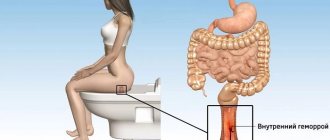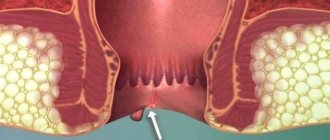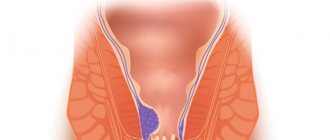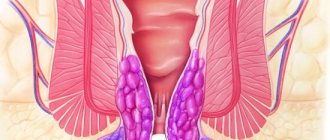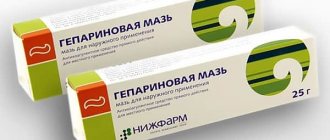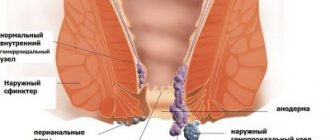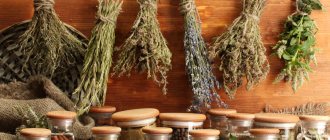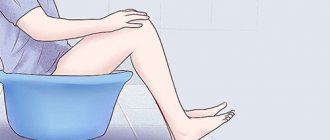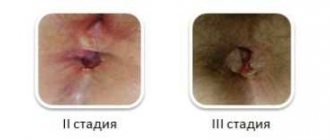Candles
A life-saving remedy for internal bleeding from hemorrhoids are suppositories:
- emergency assistance can be provided with ice suppositories - ordinary water is frozen in a similar form, the resulting suppository is carefully inserted into the anus for 10 seconds, the vessels narrow, and blood ceases to be released;
- a candle made from raw potatoes, smeared with sea buckthorn oil, is inserted into the intestine all night - the next morning the main unpleasant symptoms will disappear without a trace;
- As a filling for an ice candle, a decoction of calendula, chamomile, nettle, oak bark, sage, as well as honey and mumiyo is suitable;
Pharmacy rectal suppositories are popular for stopping bleeding - “Anuzol”, “Nigepan”, “Relief”, “Alginatol”, “Prostopin”, “Proctosan”, “Procto-Glivenol”, suppositories with methyluracil, tannin, adrenaline, heparin, propolis , sea buckthorn oil.
The causes of bleeding are trivial - but that doesn’t make it any easier
When the venous outflow of blood in the rectum is disrupted, hemorrhoidal nodes become inflamed - the anal veins fill with blood and nodes form.
They increase in size, closing the lumen of the colon, which interferes with emptying.
The causes of bleeding from the anus due to hemorrhoids are as follows:
- Constant constipation makes defecation difficult and injures the inflamed nodes, resulting in bleeding. Injuries in the colon take a very long time to heal, and the next time you have a bowel movement, bleeding begins again.
- Poor blood circulation and thinned mucosal walls lead to fissures in the anus, which are injured during defecation.
- Prolonged diarrhea also leads to injury to hemorrhoids.
- Bleeding can be caused by prolonged sitting on the toilet and strong efforts during bowel movements.
- When the disease is not treated on time, the nodes become inflamed and greatly increase in size .
Before treating the disease, you should find out exactly the causes of such troubles.
The treatment itself at the initial stage of hemorrhoids always begins with eliminating the causes.
Surgical intervention
Hemorrhoids, which are accompanied by massive blood loss, must be treated exclusively with surgical intervention. In such situations, the use of medications is only a way to prepare a person for surgery.
Hospitalization and emergency intervention to remove bleeding hemorrhoids are usually used at the last stage of the disease, when large blood loss is accompanied by thrombosis and other complications of the pathological process.
In other situations, doctors usually prescribe the following minimally invasive procedures for removing hemorrhoids:
- laser coagulation - the procedure involves coagulation of tissues and capillary vessels, which subsequently prevents bleeding;
- sclerotherapy - sclerosant is injected into the veins of the hemorrhoidal cone - a special substance that glues the walls of blood vessels, as a result of which blood loss stops;
- cryodestruction - exposure to extremely low temperatures (liquid nitrogen is used) allows you to freeze hemorrhoidal cones and stop the release of blood;
- ligation of nodules - the surgeon tightens the “leg” of the node with a special latex ligature, as a result of which the lump soon dies and comes out. Having a bowel movement allows dead tissue to be passed out in the stool.
Blood may also bleed after surgery if the procedure was performed by an insufficiently qualified specialist. In this case, repeated surgery is indicated.
After the procedure, the patient is prescribed venotonic medications or drugs that restore iron levels and hemoglobin levels in the blood.
https://youtu.be/Emyxb5x4TjE
Why do hemorrhoids bleed?
The occurrence of bleeding of hemorrhoids is just one of the symptoms of the disease at a certain stage of the disease. If the patient often complains of itching, pain and prolapse of nodular formations, then bleeding may not be a concern. Blood is more often observed after defecation. It is scarlet in color and can flow in a trickle or simply drip after passing stool. Hemorrhoids with blood occur for the following reasons:
- Diarrhea.
- Chronic constipation. These are the main reasons for bleeding in this disease. Solid feces, moving along the rectum and touching the hemorrhoids, can injure them.
- Childbirth. They often cause cracks in the rectum and the release of blood clots during hemorrhoids in women.
It could be dangerous
Hemorrhoids are a very common disease of the colon. It brings the patient not only discomfort in the anus, but also pain with bleeding, which is extremely dangerous.
At the initial stage of hemorrhoids, bleeding from the anus occurs after defecation in the form of scarlet blood stains on toilet paper.
If you do not start timely treatment, then over time you can find traces of characteristic scarlet stains on the walls of the toilet.
Bleeding is not accompanied by pain, and after bowel movement it stops altogether.
It is important to understand and know that with hemorrhoids, blood never mixes with feces, unlike other proctological diseases. But you shouldn’t be complacent about this - if you don’t start treating correctly and in a timely manner, the disease can lead to complications, including acute paroproctitis, anal fissures and even colon cancer
But you should not be complacent about this - if you do not begin to be treated correctly and in a timely manner, the disease can lead to complications, including acute paroproctitis, anal fissures and even colon cancer.
https://youtu.be/dwTIMW9TdeY
Hemorrhoids with blood in men
Statistics indicate that the male population suffers from hemorrhoids more often than the female population. This is due to the fact that men are more exposed to physical labor, carrying heavy loads, and the influence of a hereditary factor is possible.
Treatment of men with internal hemorrhoids, which is accompanied by bloody discharge, is practically no different from how female hemorrhoids are treated. An exception to the treatment of hemorrhoids in women may be during pregnancy and lactation.
Treatment of bleeding hemorrhoids in men involves the use of all forms of medications. Ointments, suppositories, tablets will perfectly help cope with bleeding. Among such drugs, on the shelf in pharmacies you can find ProctoGlivenol, Relief, Troxevasin, Proctosan, Heparin. To eliminate blood discharge from the anus, you can take a Vikasol or Dicinone tablet.
It is strongly recommended not to self-medicate! To prescribe the correct and competent treatment, you must consult a doctor. It will form a set of measures to eliminate bleeding and relieve pain symptoms.
In combination with the use of medications, you can use the folk remedies presented above.
https://youtu.be/gweIxWvTKrY
Features of treatment
Doctors strive to treat bleeding hemorrhoids comprehensively and predominantly using conservative methods. It is customary to combat hemorrhoidal bleeding with the help of:
- hemostatic and anti-inflammatory medications (local and general action);
- alternative medicine recipes;
- lifestyle changes.
It is also recommended to adjust the diet, including foods that enhance intestinal motility and dilute stool thanks to plant fiber.
Conservative treatment is justified if bleeding hemorrhoids are stage 1 or 2. In advanced cases, additionally complicated by thrombosed veins, prolapse and strangulation of internal nodules, surgical intervention is indicated.
After excision of cavernous formations, patients continue to take medications designed to relieve inflammation and reduce the likelihood of subsequent bleeding.
Clinical manifestations
Most often, blood on toilet paper is discovered after visiting the restroom. And if at first blood occurs in isolated cases, then over time hemorrhoidal bleeding turns into a constant companion of a person, becoming more and more massive.
Bleeding hemorrhoids are characterized by certain features:
- the discharge is dripping or splashing, scarlet and not dark red in color, no blood clots are observed;
- usually bleeding is not accompanied by painful sensations, the exception being situations when anal fissures are attached to hemorrhoids;
- in severe stages, bleeding may occur suddenly - a person will notice blood flowing down the thighs;
- in a complicated form of the disease, when hemorrhoidal nodules prolapse, the blood flow is massive.
Heavy bleeding is fraught with the occurrence of such a dangerous condition as anemia. If 100 ml of blood is lost every day, then the body is no longer able to cope with the problem on its own.
As a result, hemoglobin levels drop sharply, which is reflected in pale skin, rapid fatigue, low blood pressure, and dizziness. The defense system also malfunctions, so an infection may be attached.
Diagnosis of the disease
To begin with, the doctor conducts an external examination and palpation of the rectum, which makes it possible to detect nodes inside and outside.
Anoscopy is also performed - an examination with a device with an LED system built into the tube. It is called an anoscope - it helps in diagnosing the rectal mucosa to a depth of 12 cm.
Additionally, the doctor may prescribe sigmoidoscopy - examination with a device to a depth of 20-30 cm.
If there is a suspicion of tumor formations, a colonoscopy is prescribed - this is an examination of the intestines along the entire length. The device is equipped with a camera and its readings are displayed on a large monitor.
Lotions
- Cold compress - a small piece of clean cloth or bandage, folded in several layers, moistened in cool water and applied to the anus for several minutes. You can do it several times a day until the unpleasant symptoms disappear. Cold constricts blood vessels and stops bleeding, and also relieves pain, burning, redness, and itching.
- You can moisten a cotton swab with sea buckthorn oil and apply it to the painful area for a long time. A good remedy for severe inflammation and bleeding.
- Raw potatoes or beets - grated on a fine grater, wrapped in gauze and placed on the affected area for 15-30 minutes. You can do this compress twice a day.
- Rowan - the berries need to be crushed into a paste and applied to the bleeding nodes for a long time. Relief occurs after the first procedure.
Belladonna extract for hemorrhoids
Traditional methods of treating bleeding from hemorrhoids
Calendula infusion
For treatment, you must first prepare a tincture. To do this, take two tablespoons of the vegetable mixture and pour 200 ml of boiling water. The substance should be infused for two hours, after which the herbs are filtered. The resulting infusion should be used as microenemas and rinses. To do this, take 30 ml of liquid per microenema and keep the solution inside for 20 minutes. To prevent water from leaking out, the patient must lie on his stomach. Repeat the procedure daily for 10 days.
Chamomile officinalis
Chamomile heals wounds, enhancing the regeneration process and relieving inflammation
For treatment, pour a tablespoon of raw material into 200 ml of boiling water and leave the mixture for 30 minutes. After this, the patient should be given microenemas. For one procedure, 30-50 ml of solution is also taken. It is recommended to keep the mixture for at least 15 minutes also while lying on your stomach. Chamomile enemas are done three times a day for one week. The active substance not only stops bleeding, but also heals wounds, enhancing the regeneration process and relieving the inflammatory process. Treatment is continued for a week.
Video: Chamomile - a folk remedy for hemorrhoids
Yarrow decoction
To prepare the medicine, you need to pour a tablespoon of the herbal mixture into 250 ml of boiling water and simmer for 10-15 minutes over low heat. Then the mixture is allowed to brew for two hours and must be filtered. After straining, the broth should be brought to its original volume, this is done with warm boiled water. The medicine is used as a lotion; for this, gauze is moistened with a decoction and applied to the sore spot for 15 minutes, or for enemas. Enemas are done according to the method described above. Microenemas with yarrow decoction are performed 2-3 times a day for a week. Lotions can be applied up to six times a day, also for a week.
Yarrow decoction can quickly get rid of hemorrhoids
Attention! If the condition is complicated, in which patients with hemorrhoids are accompanied by bleeding, traditional methods should be combined with pharmaceutical ones. Traditional medicines affect the entire body as a whole, while traditional medicines remove the main cause of the disorder.
Video - Treatment of hemorrhoids with folk remedies at home
How are hemorrhoids and their bleeding diagnosed?
Patients experiencing bleeding from the rectum should understand that such a symptom can occur not only with hemorrhoids, but also in the case of such serious conditions as:
- rectal fissures;
- benign neoplasms in the rectum;
- cancerous tumors;
- Crohn's disease (severe chronic inflammation of the digestive tract);
- ulcerative colitis;
- rectal diverticulosis.
To prescribe the correct treatment, the doctor, first of all, makes sure that the bleeding is hemorrhoidal and not caused by any of the above pathologies.
First of all, the proctologist conducts an external examination, which detects bleeding from external hemorrhoidal cones, and palpation, which reveals internal nodules.
Instrumental diagnostic methods are also informative:
- Sigmoidoscopy. A special device is inserted into the rectal canal, which is equipped with LEDs and optics. The device allows you to examine the rectum to a depth of 30 centimeters.
- Anoscopy. The mucous membranes of the lower intestine are examined using an anoscope. This device with a mirror helps to examine the rectal canal to a depth of 12 centimeters.
- Colonoscopy. The diagnostic procedure, carried out using a long tube equipped with LEDs and a micro-camera, allows the study of the mucous membranes of the entire large intestine.
- General blood analysis. It is used to check hemoglobin and red blood cell levels. With anemia caused by hemorrhoidal bleeding, their levels are significantly reduced.
After making an accurate diagnosis and determining the stage of the pathological process, the proctologist chooses the right tactics to stop bleeding from hemorrhoids.
In mild cases, conservative treatment is prescribed; in severe situations, hospitalization and/or surgery are indicated.
Prevention
Prevention of bleeding from hemorrhoids is based on avoiding alcohol, hard work, physical inactivity, proper intimate hygiene of the anorectal area, and performing a daily set of special exercises, individual for each person.
It should be understood that without eliminating constipation or diarrhea, there is no guarantee that there will be no injury to the rectal mucosa. Therefore, the priority for bleeding hemorrhoids is the prevention of these conditions. Recommended to prevent constipation:
- adherence to 3-4 meals a day;
- correction of the diet in favor of a large amount of fiber, vegetables and fruits;
- reasonable physical activity (there are a series of exercises that improve bowel function);
- development of a defecation regime - gastrointestinal reflex at the same time;
- control of stressful situations.
How to stop bleeding
Don't be alarmed if you find blood in your stool or underwear. Blood from hemorrhoids is a common occurrence. It can be stopped with special medications that can be used at home, for example:
- suppositories with propolis - promote a healing effect;
- suppositories with adrenaline - characterized by a vasoconstrictor effect and increase the ability of blood to clot (use carefully, as blood pressure increases);
- methyluracil suppositories - heal cracks well and can instantly stop bleeding;
- astringent suppositories (bismuth, tannins) - form a protective film and prevent the formation of a blood clot in the damaged area;
- homeopathic remedies (containing oils of yarrow, sea buckthorn, belladonna, calendula, tea tree) - have a healing effect on blood vessels;
- Posterizan suppositories have an anti-inflammatory effect.
Rectal suppositories, namely their active substances, are instantly absorbed into the blood through the vessels, stimulate tissue restoration and stop pain.
If you don’t have any medications on hand and you can’t stop the bleeding, you should do the following:
- Wash with cool water or apply a cold compress. Cold constricts blood vessels, thereby stopping bleeding. cold compress for hemorrhoids hemostatic sponge for hemorrhoids
- Use a hemostatic sponge (contains furatsilin, boric acid), it has a healing and antiseptic effect. It is applied to the anus for about two minutes, the sponge becomes saturated with blood and begins to compress the blood vessels. For internal nodes, a sponge is inserted into the anus, where it dissolves on its own.
However, if after applying these steps the bleeding does not go away, you should immediately consult a specialist.
Share the article on social media. networks:
Possible complications
If you ignore the doctor’s prescription and do not take your health seriously, the disease will progress and lead to irreversible consequences and complications, including:
- anemia may develop . With a blood loss of 50-100 ml daily, the human body cannot restore it on its own. Hemoglobin will drop to a critical level and develop into a severe form of anemia. The patient's health deteriorates sharply. Pallor, dizziness, decreased blood pressure, and weakness appear. Immunity decreases, as a result of which all chronic diseases can worsen.
- Thrombosis of hemorrhoids and necrosis can lead to excessive bleeding. It is necessary to urgently go to the hospital, otherwise death is inevitable.
- Neglected hemorrhoids lead to anal fissures, fistulas and acute parapractitis .
- In addition to hemorrhoids, bloody discharge from the rectum can signal polyps, ulcerative colitis, and even the formation of a malignant tumor .
If blood appears in your stool or on toilet paper, contact your proctologist immediately. The sooner treatment is started, the more effective it will be.
